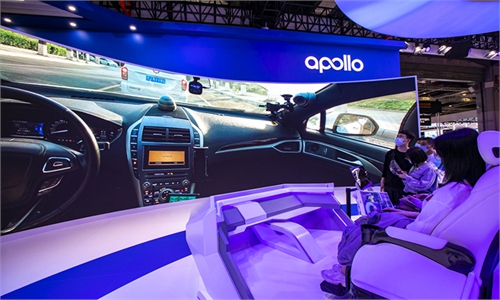
Visitors experience the autonomous driving system of Baidu Apollo at the Shanghai Auto Show, April 19, 2021. Photo: VCG
China will welcome the golden age of AI in the coming years as it will be widely used in the aerospace industry. Unmanned vehicles supported with AI are expected to go to the moon, Robin Li, founder of tech giant Baidu, said on Monday.The two major capabilities of AI, perception and control, will have a wide range of applications in the aerospace industry. It can make future Chinese lunar research stations more intelligent and can also be used in unmanned scientific exploration and resource development and utilization, Li said on Monday at the Baidu Create 2021, China's first metaverse conference hosted on its metaverse platform, XiRang.
China's deep space exploration has made great achievements and the establishment of a lunar research station, accomplishing a manned landings on the moon, and traveling to Mars will be China's the next step in space. AI will definitely play a huge role in it, Ouyang Zhiyuan, chief scientist at China's lunar exploration project, said at the event.
"I also look forward to our unmanned vehicles being able to drive to the moon," he added.
Chinese aerospace has witnessed a fast development. Xinhua News Agency reported on Sunday evening that China's Shenzhou-13 taikonauts, Ye Guangfu and Zhai Zhigang, left the space station core module Tianhe to start extravehicular activities, according to the China Manned Space Agency (CMSA).
The CMSA noted that extravehicular operations are becoming the normal work of the space station flight missions.
In the next ten years, AI will significantly lower the technical threshold and provide a technological "big base" for the intelligent transformation of all walks of life, Li said. For example, intelligent transportation will allow China's first-tier cities to lift any mobility restrictions within five years and solve the congestion problem within ten years.
Baidu Apollo has grown into the world's most active open platform for autonomous driving, with more than 210 global ecological partners and 700,000 lines of open source code.
Baidu data showed that its deep learning framework PaddlePaddle has gathered over 4 million developers, served more than 157,000 enterprises, and created 476,000 models. Furthermore, the autonomous driving travel service platform Apollo Go, known as Luobo Kuaipao, will expand to 65 cities in 2025 and 100 cities in 2030, and JiDu's first robot car will also be unveiled in 2022 with mass production starting in 2023.



